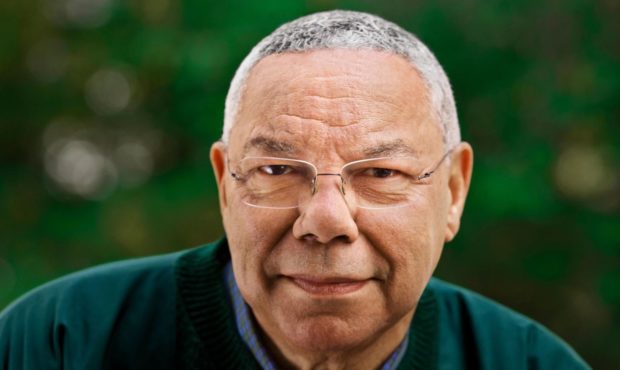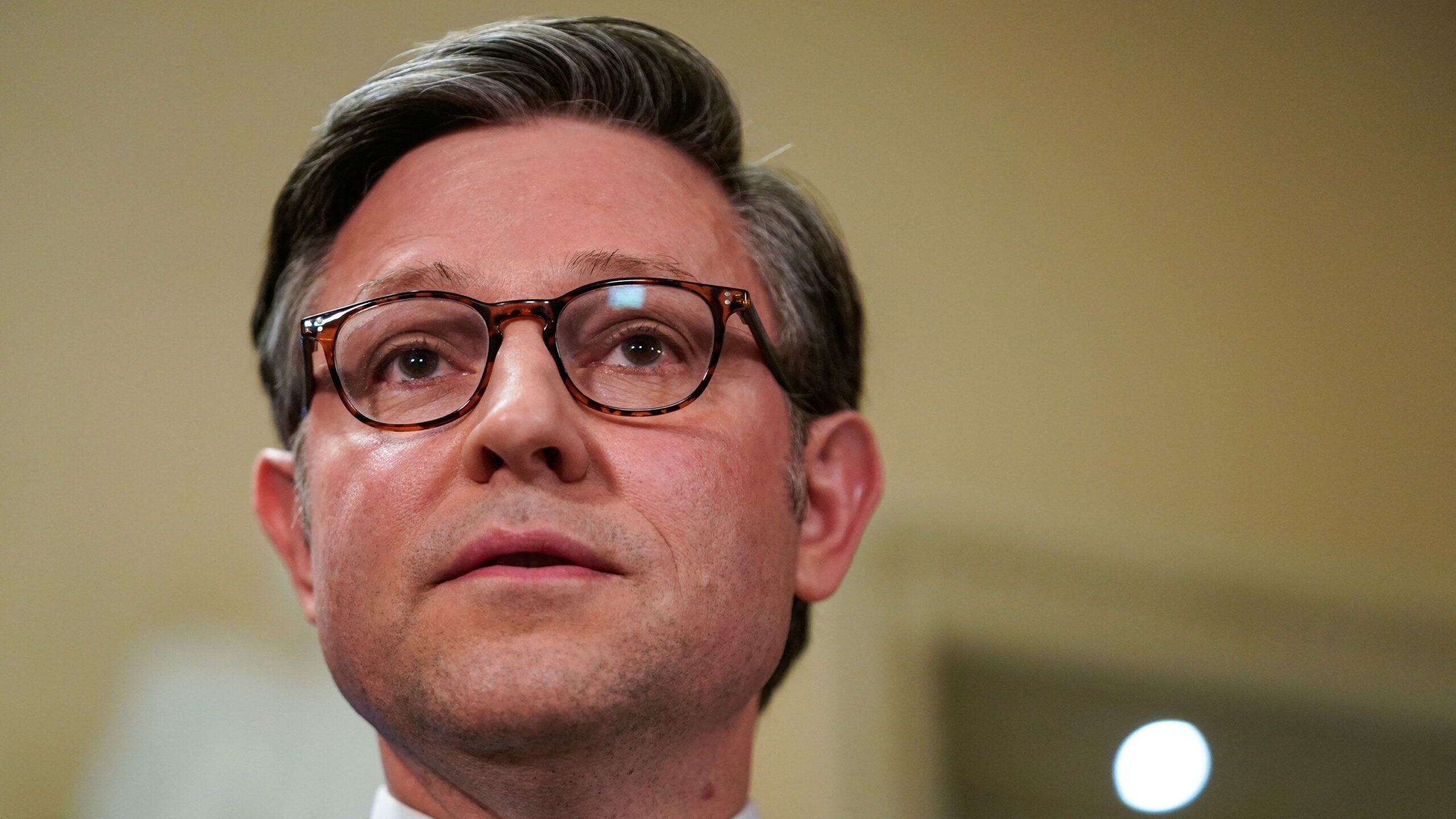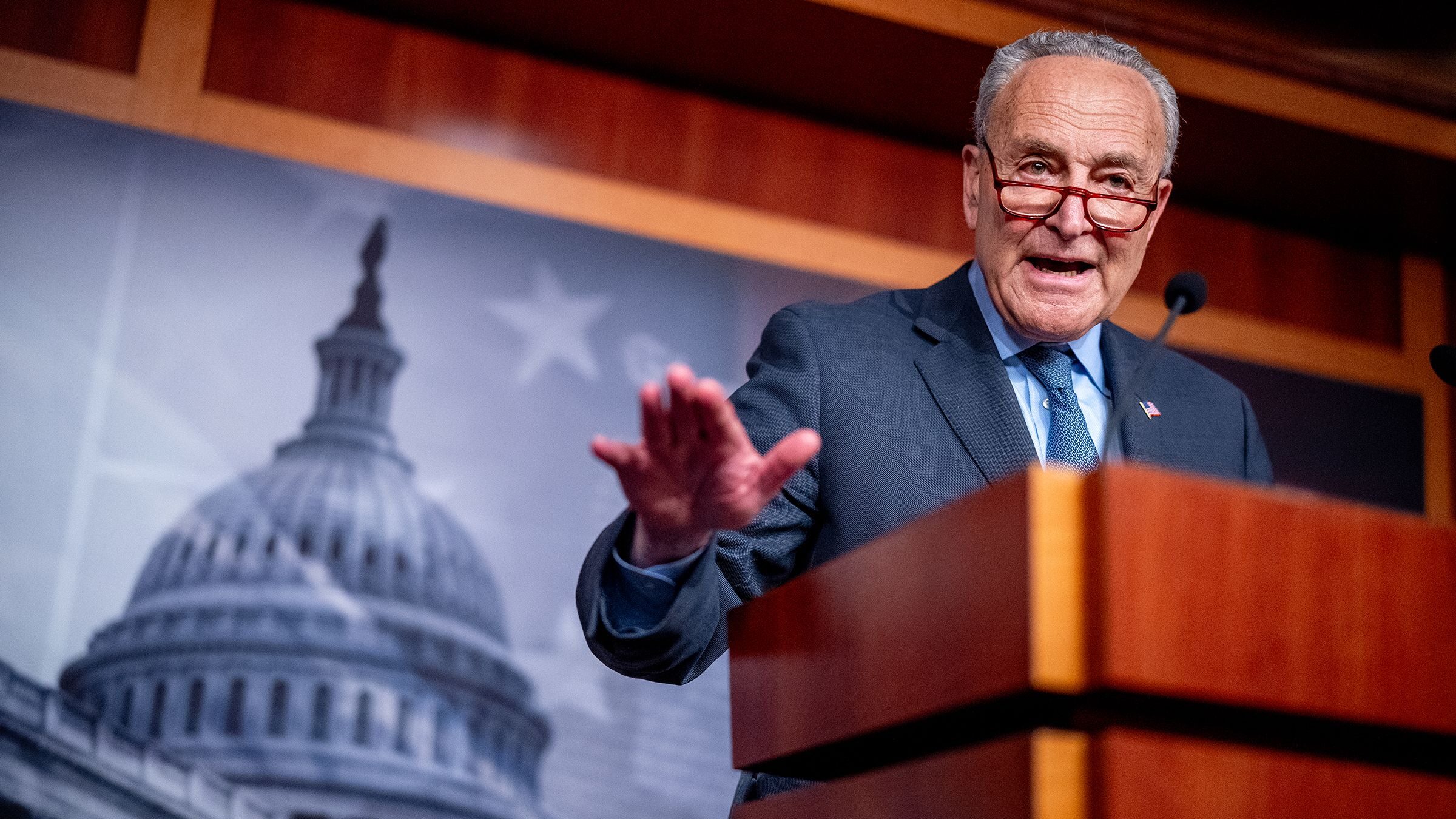Colin Powell, first Black US secretary of state, dies of Covid-19 complications amid cancer battle
Oct 18, 2021, 6:08 AM | Updated: 11:05 am

Colin Powell, the first Black US secretary of state, has died from complications from Covid-19, his family said on Facebook. Powell is shown here at his home in Virginia. Brooks Kraft LLC/Corbis via Getty Images
(CNN) — Colin Powell, the first Black US secretary of state whose leadership in several Republican administrations helped shape American foreign policy in the last years of the 20th century and the early years of the 21st, has died from complications from Covid-19, his family said on Facebook. He was 84.
“General Colin L. Powell, former U.S. Secretary of State and Chairman of the Joint Chiefs of Staff, passed away this morning due to complications from Covid 19,” the Powell family wrote on Facebook, noting he was fully vaccinated.
A source familiar with the matter said Powell had multiple myeloma, a cancer of plasma cells that suppresses the body’s immune response. Even if fully vaccinated against Covid-19, those who are immunocompromised are at greater risk from the virus.
“We have lost a remarkable and loving husband, father, grandfather and a great American,” the family said.
Powell was a distinguished and trailblazing professional soldier whose career took him from combat duty in Vietnam to becoming the first Black national security adviser during the end of Ronald Reagan’s presidency and the youngest and first African American chairman of the Joint Chiefs of Staff under President George H.W. Bush. His national popularity soared in the aftermath of the US-led coalition victory during the Gulf War, and for a time in the mid-90s, he was considered a leading contender to become the first Black President of the United States. But his reputation would be forever stained when, as George W. Bush’s first secretary of state, he pushed faulty intelligence before the United Nations to advocate for the Iraq War, which he would later call a “blot” on his record.
Bush said in a statement Monday that Powell was “a great public servant” who was “such a favorite of Presidents that he earned the Presidential Medal of Freedom — twice. He was highly respected at home and abroad. And most important, Colin was a family man and a friend.”
Though Powell never mounted a White House bid, when he was sworn in as Bush’s secretary of state in 2001, he became the highest-ranking Black public official to date in the country, standing fourth in the presidential line of succession.
“I think it shows to the world what is possible in this country,” Powell said of his history-making nomination during his Senate confirmation hearing. “It shows to the world that: Follow our model, and over a period of time from our beginning, if you believe in the values that espouse, you can see things as miraculous as me sitting before you to receive your approval.”
The Point: The Colin Powell Republican no longer exists in the Republican Party
Later in his public life, Powell would grow disillusioned with the Republican Party’s rightward lurch and would use his political capital to help elect Democrats to the White House, most notably Barack Obama, the first Black president whom Powell endorsed in the final weeks of the 2008 campaign.
The announcement was seen as a significant boost for Obama’s candidacy due to Powell’s widespread popular appeal and stature as one of the most prominent and successful Black Americans in public life.
Powell is survived by his wife, Alma Vivian (Johnson) Powell, whom he married in 1962, as well as three children.
It is not clear if Powell had received a booster dose of the vaccine. Covid-19 vaccines are a highly effective tool in preventing severe disease and death, but no vaccine is 100% effective.
More than 7,00 breakthrough cases of Covid-19 that have resulted in death have been reported to the US Centers for Disease Control and Prevention through October 12. By that time, more than 187 million people in the US were fully vaccinated. That’s one out of every 26,000 fully vaccinated people who has died of Covid-19, or 0.004%.
Of those breakthrough cases resulting in death, 85% were among people age 65 and older and 57% were among men, according to the CDC.
CDC data also show that the risk of dying from Covid-19 is more than 11 times higher for unvaccinated adults than it is for vaccinated adults throughout August. Among seniors, who are more susceptible to severe Covid-19, that gap is smaller. Among those 80 and older, the risk of dying from Covid-19 in August was about five times higher among unvaccinated people than among fully vaccinated people.
Professional soldier
Colin Luther Powell was born April 5, 1937, in Harlem, New York, to Jamaican immigrants. After growing up in the South Bronx, Powell attended school at the City College of New York, where he participated in ROTC, leading the precision drill team and attaining the top rank offered by the corps, cadet colonel.
“I liked the structure and the discipline of the military,” Powell said, according to a CNN profile of him in the early 2000s. “I felt somewhat distinctive wearing a uniform. I hadn’t been distinctive in much else.”
He entered the US Army after graduating in 1958, and later served two tours in South Vietnam during the 1960s, where he was wounded twice, including during a helicopter crash in which he rescued two soldiers. He stayed in the Army after returning home, attending the National War College and rising in leadership. He was promoted to brigadier general in 1979, appointed as Reagan’s final national security adviser in 1987 and was tapped by the elder Bush in 1989 to head the Joint Chiefs of Staff.
Powell’s tenure in the elder Bush’s administration was marked by his involvement in some of the most notable American military actions of the late 20th century, including the 1989 Panama operation, the 1991 Gulf War and the US humanitarian intervention in Somalia, though he retired from the Army days before the disastrous Battle of Mogadishu.
Although Powell was initially reluctant to commit US troops when Iraq invaded Kuwait in 1990, he became one of the administration’s most trusted spokesmen when the assault on Saddam Hussein’s army finally came.
“First we’re going to cut it off. Then we’re going to kill it,” Powell famously said at a news conference at the time, referring to the Iraqi army.
Following the assault, Powell became something of a national hero, enjoying a 71% favorability rating in the first few year years after the war. His efforts during the war also earned him two prominent awards: a Congressional Gold Medal in March 1991 “in recognition of his exemplary performance in planning and coordinating” the US response to Iraq’s invasion, and a Presidential Medal of Freedom.
As the elder Bush presented Powell with the award at a White House ceremony in 1991, he said the general’s “deep compassion for every one of the thousands of men and women under (his) command will always be remembered.”
During Powell’s time in the military, which lasted until 1993, he also received a number of other notable awards, including the Bronze Star and two Purple Hearts. He received his fourth star in 1989, becoming the second African American to rise to that rank.
In addition to the military awards, Powell also received the President’s Citizens Medal, the Secretary of State Distinguished Service Medal, and the Secretary of Energy Distinguished Service Medal, as well as a second Presidential Medal of Freedom, awarded with distinction, from President Bill Clinton.
Top diplomat during turbulent time
With a prominent national profile, Powell was floated as a potential presidential candidate in the 1996 election. But in a highly anticipated decision, he declined to participate in the race, citing a lack of “passion” for electoral politics.
“Such a life requires a calling that I do not yet hear,” he told reporters in 1995. “And for me to pretend otherwise would not be honest to myself, it would not be honest to the American people.”
Powell was again encouraged to run in the 2000 presidential election, but rebuffed calls for him to mount a bid. He instead endorsed George W. Bush, delivering a speech at the Republican National Convention in which he argued that the then-governor of Texas would “help bridge our racial divides.”
He was Bush’s first Cabinet selection when he was announced as the 43rd President’s nomination for secretary of state, and with his expertise in foreign policy and widespread popularity, he was unanimously confirmed by the Senate.
He shared Bush’s reluctance to project military strength across the globe, a view that was quickly displaced by the terrorist attacks of September 11, 2001. As Bush’s top diplomat, he was tasked with building international support for the War on Terror, including the Afghanistan War, but it was his involvement in the administration’s push for intervention in Iraq, over the concerns of many of America’s longtime allies, for which his tenure at State would become best known.
In February 2003, Powell delivered a speech before the United Nations in which he presented evidence that the US intelligence community said proved Iraq had misled inspectors and hid weapons of mass destruction.
“There can be no doubt,” Powell warned, “that Saddam Hussein has biological weapons and the capability to rapidly produce more, many more.”
Inspectors, however, later found no such weaponry in Iraq, and two years after Powell’s UN speech, a government report said the intelligence community was “dead wrong” in its assessments of Iraq’s weapons of mass destruction capabilities before the US invasion.
But the damage was already done — to both Iraq, which the US went to war with just six weeks after Powell’s speech, and to the reputation of the once highly popular statesman, who was reportedly told by then-Vice President Dick Cheney before the UN speech: “You’ve got high poll ratings; you can afford to lose a few points.”
Powell, who left the State Department in early 2005 after submitting his resignation to Bush the previous year, later called his UN speech a “blot” that will forever be on his record.
“I regret it now because the information was wrong — of course I do,” he told CNN’s Larry King in 2010. “But I will always be seen as the one who made the case before the international community.”
“I swayed public opinion, there’s no question about it,” he added, referring to how influential his speech was on public support for the invasion.
In his 2012 memoir, “It Worked for Me,” Powell again acknowledged the speech, writing that his account of it in the book would likely be the last he publicly made.
“I am mad mostly at myself for not having smelled the problem. My instincts failed me,” he wrote, referring to the report he used that contained faulty evidence of supposed Iraqi WMDs. “It was by no means my first, but it was one of my most momentous failures, the one with the widest-ranging impact.”
“The event will earn a prominent paragraph in my obituary,” Powell wrote.
Shifting politics
After leaving the Bush administration, Powell returned to private life. He joined the renowned venture capital firm Kleiner Perkins in 2005, where he worked as a strategic adviser until his death. For a time, he gave speeches at “Get Motivated!” business seminars, and he authored the 2012 memoir.
Though the large majority of Powell’s time as a public servant was spent in Republican administrations, the later years of his life saw him supporting Democratic presidential candidates and harshly criticizing top Republican leaders.
By 2008, the longtime Republican’s coveted presidential endorsement went to another party when he announced his support for Obama’s White House bid. At the time, he touted Obama’s “ability to inspire” and the “inclusive nature of his campaign,” while criticizing attacks on the Illinois senator by Republican presidential nominee John McCain’s campaign as “inappropriate.” He was later named an honorary co-chair of Obama’s inauguration and endorsed him again in 2012.
Powell went on to vote for Hillary Clinton in 2016 over Donald Trump, whom he had strongly condemned as a “national disgrace and an international pariah.”
In an extraordinary move that year, three presidential electors in Washington state cast votes for Powell rather than Clinton, resulting in state fines that were later upheld by the Supreme Court.
He again snubbed Trump in 2020 during the President’s second campaign, announcing his support for Joe Biden in June of that year while blasting Trump’s presidency.
“We have a Constitution. And we have to follow that Constitution. And the President has drifted away from it,” he told CNN, adding that he “certainly cannot in any way support President Trump this year.” The retired general later delivered an address in support of Biden during the Democratic National Convention.
And after Trump incited a deadly insurrection at the US Capitol in early January 2021, Powell told CNN that he no longer considered himself a Republican, with the longtime grandee of the GOP saying he was now simply watching events unfold in a country he long served.
“I can no longer call myself a fellow Republican. I’m not a fellow of anything right now,” he told CNN’s Fareed Zakaria on “GPS.” “I’m just a citizen who has voted Republican, voted Democrat throughout my entire career. And right now, I’m just watching my country and not concerned with parties.”
This story has been updated with additional information.
The-CNN-Wire
™ & © 2021 Cable News Network, Inc., a WarnerMedia Company. All rights reserved.













